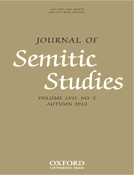
JOURNAL OF SEMITIC STUDIES
Scope & Guideline
Exploring the Depths of Semitic Heritage
Introduction
Aims and Scopes
- Linguistic Analysis of Semitic Languages:
The journal emphasizes detailed linguistic studies of various Semitic languages, including Hebrew, Aramaic, and Arabic, focusing on syntax, morphology, phonology, and semantics. - Historical and Comparative Linguistics:
It supports research that reconstructs the historical development of Semitic languages and examines their relationships with other language families, particularly through comparative analysis. - Cultural and Literary Studies:
The journal encourages exploration of literary texts and cultural artifacts associated with Semitic languages, analyzing their historical context, themes, and impact. - Dialectology and Sociolinguistics:
Research on the dialectal variations within Semitic languages and the sociolinguistic factors influencing these variations is a core area, reflecting the diverse linguistic landscape. - Interdisciplinary Approaches:
The journal promotes interdisciplinary studies that connect linguistics with fields such as archaeology, history, religious studies, and anthropology, enriching the understanding of Semitic languages.
Trending and Emerging
- Sociolinguistic Perspectives:
There is a notable increase in research that examines sociolinguistic aspects of Semitic languages, including language use in different communities, language contact, and the impact of sociopolitical factors on language. - Cognitive Linguistics:
Emerging studies are increasingly applying cognitive linguistic frameworks to understand the semantics and pragmatics of Semitic languages, offering fresh insights into language processing and meaning-making. - Digital Humanities and Language Technology:
The intersection of Semitic studies with digital humanities is gaining traction, with research focusing on the application of computational methods and digital tools for linguistic analysis and preservation of texts. - Language and Identity:
Recent publications are exploring the relationship between language and identity, particularly how linguistic features relate to cultural identity among speakers of Semitic languages. - Intertextuality and Literary Analysis:
There is a rising interest in intertextual studies that analyze the influence of Semitic languages on each other and their literary traditions, focusing on themes such as adaptation, translation, and cultural exchange.
Declining or Waning
- Traditional Philological Studies:
There has been a decline in purely philological approaches, focusing on textual criticism and manuscript studies, as the journal increasingly emphasizes linguistic and sociolinguistic analyses. - Exclusively Theoretical Linguistics:
Papers that engage solely in abstract theoretical linguistics without empirical data or practical application have become less common, as there is a growing preference for research grounded in real-world language use. - Historical Linguistics of Lesser-Known Dialects:
Research focusing on lesser-known or endangered Semitic languages appears to be waning, possibly due to limited resources or scholarly attention compared to more widely studied languages like Hebrew and Arabic. - Aging Linguistic Models:
The journal has seen fewer submissions that rely on outdated linguistic models or frameworks, indicating a shift towards more contemporary approaches in linguistic theory.
Similar Journals

LINGUISTIQUE
Bridging Gaps in Linguistic UnderstandingLINGUISTIQUE, an esteemed journal published by PRESSES UNIV FRANCE, serves as a vital platform for scholarly discourse in the fields of linguistics and language studies. With its ISSN 0075-966X and E-ISSN 2101-0234, this French journal has been a significant contributor to the understanding of linguistic phenomena since its inception in 2004, and it continues its journey through to 2024. Although currently categorized in the Q4 quartile for both Arts and Humanities (miscellaneous) and Linguistics and Language, its commitment to publishing quality research encourages a diverse range of articles, reviews, and innovative studies. Positioned in the 32nd and 29th percentiles for its respective fields according to Scopus rankings, LINGUISTIQUE is dedicated to advancing knowledge and stimulating engagement among researchers, professionals, and students alike. While it does not offer open access, the journal remains an essential resource for those who seek to deepen their understanding of linguistic principles in a global context, facilitating a richer discourse that connects theory with practice.

Skandinavskaya Filologiya
Exploring the Depths of Scandinavian Linguistics.Skandinavskaya Filologiya is a distinguished academic journal published by St Petersburg University Press that specializes in Scandinavian philology and linguistics. With its ISSN 0202-2397 and E-ISSN 2618-9518, this journal serves as a vital platform for scholarly articles that explore the intricate languages, literature, and cultural nuances of the Scandinavian region. The journal seeks to promote interdisciplinary research and foster collaboration among linguists, literary scholars, and cultural researchers interested in the rich heritage and contemporary developments within Scandinavian studies. Although the journal operates without open access, it is committed to enhancing academic discourse and providing a valuable resource for students, professionals, and researchers. Located in the vibrant city of St Petersburg, Russia, the journal aims to bridge the gap between Eastern and Western scholarship in Scandinavian philology, making it a significant contributor to the field.
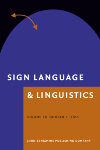
Sign Language & Linguistics
Elevating Research in Sign Language StudiesSign Language & Linguistics is an esteemed academic journal published by John Benjamins Publishing Co, dedicated to advancing the field of sign language studies and linguistics. With an ISSN of 1387-9316 and an E-ISSN of 1569-996X, this journal has earned a prominent place in the linguistic community, achieving a Q1 ranking in both the Linguistics and Language category, and standing out within the Scopus rankings, placing in the 77th percentile among the Arts and Humanities and 75th percentile in the Social Sciences categories. Sign Language & Linguistics spans over two decades of research, offering comprehensive insights and analyses from 1998 to 2024, promoting high-quality scholarly communication. Aimed at researchers, professionals, and students alike, this journal is essential for those exploring the intersection of sign languages, linguistics, and cultural studies, facilitating progressive discourse and fostering an understanding of this vital mode of human communication.
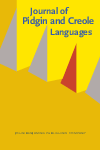
JOURNAL OF PIDGIN AND CREOLE LANGUAGES
Diving Deep into the World of Language DiversityJOURNAL OF PIDGIN AND CREOLE LANGUAGES, published by John Benjamins Publishing Co, is a leading international journal dedicated to the study of pidgin and creole languages, offering a unique platform for interdisciplinary research within the fields of linguistics and language studies. With an impressive impact factor reflected in its 2023 Scopus rankings—placing it in the Q2 category for both Linguistics and Language—this journal has established itself as an essential resource for academics and practitioners alike. Covering a broad temporal scope from 1986 to 2024, it promotes innovative research that advances the understanding of language evolution, socio-linguistics, and cultural dynamics. The journal’s focus on both theoretical and practical perspectives makes it particularly valuable for researchers, professionals, and students interested in the complexities of language and identity. Although it does not currently offer Open Access, its commitment to quality scholarship ensures that each issue presents cutting-edge research and critical insights into the world of pidgins and creoles.

Miscelanea de Estudios Arabes y Hebraicos-Seccion Arabe-Islam
Fostering Scholarly Exchange in Arabic and Hebrew StudiesMiscelanea de Estudios Arabes y Hebraicos-Seccion Arabe-Islam is a distinguished academic journal dedicated to the study of Arabic and Islamic studies, published by UNIV GRANADA, EDITORIAL. With an ISSN of 1696-5868 and E-ISSN 2341-0906, this publication provides a vital platform for scholars and researchers interested in the deep historical, cultural, and linguistic connections between the Arab and Hebrew worlds. Situated in the heart of Granada, Spain, this journal aims to promote interdisciplinary approaches and foster dialogue among academics in these rich fields of study. Although it operates under traditional access protocols, the journal’s commitment to quality is reflected in its rigorous peer-review process, making it a valuable resource for researchers, professionals, and students alike. By engaging with cutting-edge research and critical perspectives, the journal plays an essential role in enhancing the understanding of Arabic and Islamic heritage today.

Taiwan Journal of Linguistics
Pioneering Research for a Deeper Understanding of LinguisticsTaiwan Journal of Linguistics, published by CRANE PUBL CO, is a prominent Open Access journal dedicated to the field of linguistics since its inception in 2003. With its ISSN 1729-4649 and E-ISSN 1994-2559, this journal serves as a vital platform for the dissemination of significant research and scholarly discussions from Taiwan and beyond. The journal particularly focuses on advancing knowledge in linguistic theory, language acquisition, phonetics, and sociolinguistics, catering to a diverse academic audience including researchers, professionals, and students. Although it currently holds a Q4 ranking in the Linguistics and Language category, the journal's commitment to quality and accessibility positions it as an emerging resource for those engaged in language studies. Currently ranked #584 in Arts and Humanities and #668 in Social Sciences, it provides critical insights and fosters scholarly exchanges that enhance understanding within the field. The journal's open access model ensures the broadest reach for its published articles, facilitating the global sharing of linguistic research. For more information, visit the journal’s website to explore its latest publications and submission guidelines.

JOURNAL OF INDO-EUROPEAN STUDIES
Unveiling the Rich Tapestry of Language and CultureJOURNAL OF INDO-EUROPEAN STUDIES, published by the Institute for the Study of Man, is a prestigious academic journal dedicated to the interdisciplinary exploration of the Indo-European languages and cultures. With an ISSN of 0092-2323, this journal has gained notable recognition within the fields of Anthropology, Archaeology, History, Linguistics, and Literature, as evidenced by its commendable placement in the Category Quartiles for 2023. Specifically, it ranks in Q2 in History and Literature, and maintains a strong presence in Q3 across various other humanities disciplines. Though it ceased coverage in Scopus in 2021, it continues to serve as a vital resource for scholars seeking to delve into the complexities of Indo-European studies, presenting both theoretical and empirical research. The journal is particularly significant for researchers aiming to address contemporary questions while reflecting on historical contexts. With a focus on rigorous scholarship, it plays an essential role in fostering discourse among academics and students alike, and remains a crucial platform for contributions within its diverse scope.
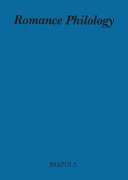
ROMANCE PHILOLOGY
Elevating the Discourse in Romance Linguistics and LiteratureROMANCE PHILOLOGY is a distinguished academic journal dedicated to the exploration of language, literature, and linguistic theory within the Romance language family. Published by BREPOLS PUBL, it offers a platform for scholars, researchers, and practitioners to disseminate their findings and engage with the latest developments in these fields. The journal's impact factor reflects its standing, positioned within the Q4 category in Linguistics and Language and Q3 in Literature and Literary Theory for 2023, making it an essential resource for those studying Romance philology. Although coverage in Scopus was discontinued in 2021, the journal maintains a commitment to rigorous academic standards and comprehensive peer-review processes. With a broad scope encompassing theoretical and practical aspects of Romance languages and literatures, ROMANCE PHILOLOGY invites contributions that push the boundaries of knowledge and enrich the academic dialogue surrounding these vital areas of study. For those passionate about linguistic and literary pursuits, this journal stands as a significant gateway into the evolving discourse of Romance studies.
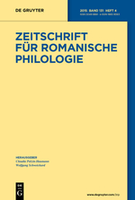
ZEITSCHRIFT FUR ROMANISCHE PHILOLOGIE
Unveiling the Heritage of Romance Languages Since 1877ZEITSCHRIFT FUR ROMANISCHE PHILOLOGIE, published by Walter de Gruyter GmbH, stands as a prominent peer-reviewed journal dedicated to the fields of Linguistics, Literature, and Literary Theory. Established in 1877 and continuing its legacy to the present day, this esteemed journal offers a platform for comprehensive scholarship that explores the intricacies of Romance languages and their literary heritage. With a notable Q1 ranking in Literature and Literary Theory and a Q2 ranking in Linguistics and Language, it has secured its place among leading resources in the humanities. Researchers, educators, and students benefit from its rich historical context and current contributions to the understanding of Romance languages and literature. Though currently not available as Open Access, the journal prioritizes the dissemination of high-quality research, making significant strides in fostering academic dialogue and advancement. Its address at Genthiner Straße 13, Berlin, Germany, situates it in a hub of scholarly activity, bridging the past with contemporary literary discourse.

Studi Slavistici
Unveiling the Rich Tapestry of Slavic LiteratureStudi Slavistici is an esteemed academic journal published by FIRENZE UNIV PRESS, focusing on the rich and diverse fields of Cultural Studies, Linguistics and Language, and Literature and Literary Theory. Since its initiation in 2004, it operates under an Open Access model, providing unrestricted access to its contents and fostering a wider dissemination of research. Based in Italy, this journal serves as a vital platform for scholars and researchers engaged in Slavic studies and beyond, encouraging interdisciplinary dialogue and innovative approaches. With its current Quartile rankings in the Q4 category across various domains, it plays a significant role in shaping dialogues within the academic community while offering insights into contemporary and historical perspectives. By maintaining an inclusive vision and engaging with critical issues, Studi Slavistici remains dedicated to advancing knowledge and scholarship in these intricate fields.